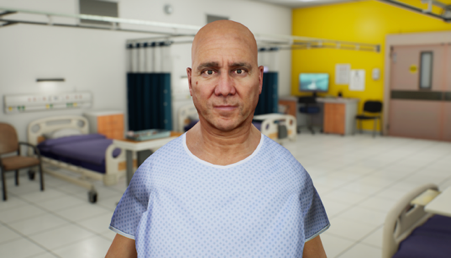
A former NHS surgeon has created an AI-powered “virtual patient” which helps to keep skills sharp during a time when most in-person training is on hold.
Dr Alex Young is a trained orthopaedic and trauma surgeon who founded Virti and set out to use emerging technologies to provide immersive training for both new healthcare professionals and experienced ones looking to hone their skills.
COVID-19 has put most in-person training on hold to minimise transmission risks. Hospitals and universities across the UK and US are now using the virtual patient as a replacement—including our fantastic local medics and surgeons at the Bristol NHS Foundation Trust.
The virtual patient uses Natural Language Processing (NLP) and ‘narrative branching’ to allow medics to roleplay lifelike clinical scenarios. Medics and trainees can interact with the virtual patient using their tablet, desktop, or even VR/AR headsets for a more immersive experience.
Dr Alex Young comments:
“We’ve been working with healthcare organisations for several years, but the pandemic has created really specific challenges that technology is helping to solve. It’s no longer safe or practicable to have 30 medics in a room with an actor, honing their clinical soft-skills. With our virtual patient technology, we’ve created an extremely realistic and repeatable experience that can provide feedback in real time. This means clinicians and students can continue to learn valuable skills.
Right now, communication with patients can be very difficult. There’s a lot of PPE involved and patients are often on their own. Having healthcare staff who are skilled in handling these situations can therefore make a huge difference to that patient’s experience.”
Some of the supported scenarios include: breaking bad news, comforting a patient in distress, and communicating effectively whilst their faces are obscured by PPE. Virti’s technology was also used at the peak of the pandemic to train NHS staff in key skills required on the front line, such as how to safely use PPE, how to navigate an unfamiliar intensive care ward, how to engage with patients and their families, and how to use a ventilator.
Tom Woollard, West Suffolk Hospital Clinical Skills and Simulation Tutor, who used the Virti platform at the peak of the COVID pandemic, comments:
“We’ve been using Virti’s technology in our intensive care unit to help train staff who have been drafted in to deal with COVID-19 demand.
The videos which we have created and uploaded are being accessed on the Virti platform by nursing staff, physiotherapists and Operational Department Practitioners (ODPs) to orient them in the new environment and reduce their anxiety.
The tech has helped us to reach a large audience and deliver formerly labour-intensive training and teaching which is now impossible with social distancing.
In the future, West Suffolk will consider applying Virti tech to other areas of hospital practice.”
The use of speech recognition, NLP, and ‘narrative branching’ provides a realistic simulation of how a patient would likely respond—providing lifelike responses in speech, body language, and mannerisms.
The AI delivers real-time feedback to the user so they can learn and improve. With upwards of 70 percent of complaints against health professionals and care providers attributable to poor communication, the virtual patient could help to deliver better care while reducing time spent handling complaints.
Virti’s groundbreaking technology has – quite rightly – been named one of TIME’s best inventions of 2020.
Interested in hearing industry leaders discuss subjects like this? Attend the co-located 5G Expo, IoT Tech Expo, Blockchain Expo, AI & Big Data Expo, and Cyber Security & Cloud Expo World Series with upcoming events in Silicon Valley, London, and Amsterdam.






